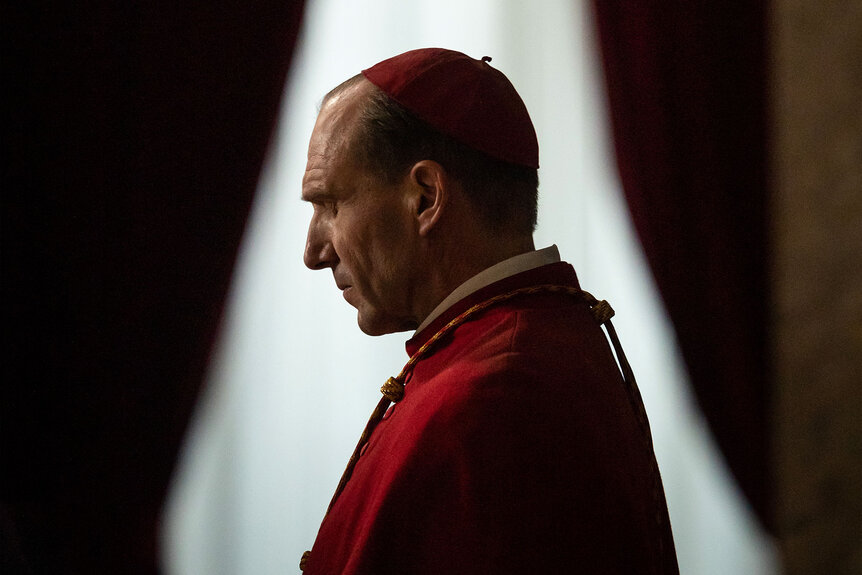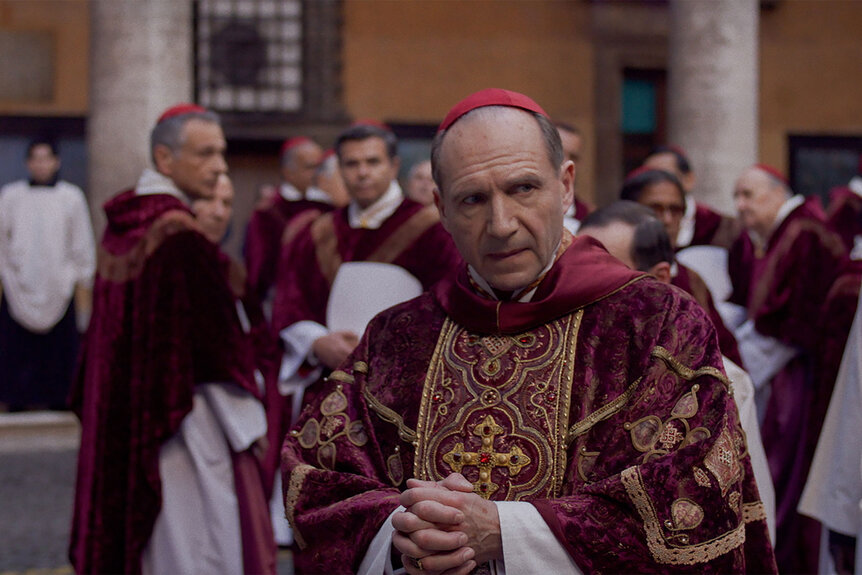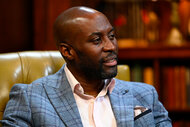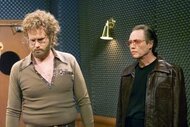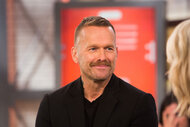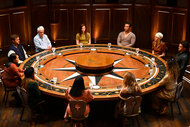Conclave's Ending, Explained: Who Becomes the New Pope?
How does director Edward Berger's film adaptation of Robert Harris' novel end?
**SPOILER WARNING!! Spoilers below for Conclave!**
If the movie title Conclave seems familiar, you might have heard of author Robert Harris' 2016 historical fiction novel of the same name. Both the book and the film document a fictional 72 hours at the Vatican when a conclave of Cardinals from around the world is assembled to elect the next pope.
Conclave is the latest project from 2022's Academy Award-winning director Edward Berger (All Quiet on the Western Front). He adapts Harris' book into an absorbingly, taut mystery/thriller. Set in contemporary times, Berger peels back the curtain on the ancient protocols of the Roman Catholic Church, as well as the very human power machinations by the Cardinals jockeying to lead the Church. All is witnessed through the eyes of Ralph Fiennes' Cardinal Thomas Lawrence, a well-respected priest who is tasked to coordinate and oversee the execution of the sequestered vote to select the next pope, in his role as Dean of the College of Cardinals. A reluctant participant due to his own doubts regarding the Church, Lawrence must see the vote through despite major twists and turns in the process.
RELATED: How a New Pope Is Chosen: The Real World Inspiration Behind Conclave
While Peter Straughan's screenplay does adhere closely to the book's structure and characters, the Conclave film diverges in places, especially regarding a major reveal presented in the last act.
What happens at the end of Conclave, explained
In Harris' book, Cardinal Vincent Benítez is the Filipino Archbishop of Baghdad. He is a surprise addition to the conclave vote, as he was made a Cardinal in secret by the recently-deceased pope. Throughout the sequestered voting process, the conclave comes to know Benítez as an exceptionally compassionate and progressive representative of the Church. When he wins the final vote, Cardinal Jacopo Baldassare Lomeli (Cardinal Lawrence in the film) uncovers that Benítez was born intersex and raised by his family as a male. Lomeli only discovers his condition in the aftermath of a bombing when he is injured and examined by doctors. He intended to resign and undergo gender reassignment surgery, but the former pope declined his request and made him a Cardinal instead.
RELATED: Everything to Know About Conclave, the Papal Thriller Starring Ralph Fiennes
In the film, Cardinal Benitez (Carlos Diehz) from Mexico is also voted by the conclave to be the next pope. He takes the name of Pope Innocent. But before he is officially presented to the public, Cardinal Lawrence (Fiennes) finds out from his assistant, Monsignor Raymond O'Malley (Brían F. O'Byrne), that Benitez' mysteriously canceled medical procedure at a clinic in Switzerland was for gender reassignment. Born intersex but unaware until a medical condition revealed it, he told the former pope that he intended to resign. The former pope forbade it and instead made him the Archbishop of Kabul. Cardinal Lawrence agrees not to tell anyone, and it's implied that he does so because Innocent is a good person with a unique perspective that will bring the Church forward with much needed progressive attitudes regarding the compassion and understanding of all persons.
Who is chosen to become the new pope in Conclave?
In the end, Cardinal Benitez becomes the new pope.
What does intersex mean?
An intersex individual is a person with physical or chromosomal characteristics which don’t fit the typical definition of male or female. Intersex is an umbrella term encompassing dozens of presentations some of which are apparent from birth, while others become apparent during puberty or never. It’s estimated that as much as 2% of the global population is intersex, with many individuals going their whole lives without realizing.
Some intersex folks might have exterior genitals which don’t align with their internal physiology, while others have an uncommon chromosomal mix. While most people have either XX or XY chromosomes, it’s possible to have XXY, XXX, XYY, and other chromosomal combinations. Other people have some cells which are XX and some which are XY.
Biology is the Wild West, and nature will do anything that works. The fact is that biology is built on variation, it’s just humans who want everything to fit inside a box. In reality, the category of intersex is socially constructed and serves to spotlight the failures of language and categorization. It’s an implicit admission that our conventional binary thinking when it comes to biology is incomplete. It's a failure of definitions, not of people. Intersex people have always been and will continue to be part of typical human variation.
Having intersex characteristics almost never requires any medical intervention. Everyone’s relationship with and expression of their body is personal, and decisions should be made between an individual and their medical providers. Historically, parents and doctors have made a decision about an intersex baby’s sexual or gender identity, and administered hormone therapies and/or surgeries to that effect. More recently, activists have argued that those decisions often don’t align with a person’s internal identity later in life. Ultimately, they argue that non-health related decisions about the bodies of intersex children should be left up to them and not carried out as babies without their consent.
Conclave puts our social discomfort with sexual and gender identity under a spotlight in one of the most morally charged locations on the planet. It’s also a story about secrecy, both within the Vatican and within our personal lives, and the consequences of those secrets when they come to light.
Conclave stars, creatives explain the film’s surprising ending
A truly unexpected turn of events for those not familiar with the book, Berger said he and his team worked for months on the private confrontation between Lawrence and Benitez, examining the reveal from many perspectives, including Fiennes' reaction. They also consulted with the LGBTQ advocacy organization, GLAAD, to get their insights on how best to position the moment.
Berger said, "We asked, 'How do we add to the cultural discourse here instead of riling people up and getting people mad, whichever side you know they're on?"
In the end, Berger said it all hinged on the subtlety of the portrayal by actor Carlos Diehz. "I really looked the world over to find someone who I didn't know from before," he explained of his year-long search for the part. "Because knowing [an actor] from before, you have all these associations with other roles and you think, 'That can't be because I saw him in that role...,' and somehow that muddies the water. But if he's really, utterly unknown and you've never seen him before, then he can say these lines, and you can look into his eyes, and you go, 'I believe that that could be true,'" he said of the film's reveal.
Praising the work Diehz in landing the emotional moment, Berger said, "That is really difficult to pull off. Not everyone can. You need to have a side in you that embraces the in-between certainties and not everyone has that. But he says it so beautifully and gently and sensitively that you think, he's just like you and I. Another human being that has his own thoughts and paths to carve in life, and everyone's path is going to be different."
Interestingly, actor John Lithgow had a similar experience with his breakout role in the 1982 film, The World According to Garp, where he played the trans character, Roberta Muldoon.
Lithgow observed, "When I played Roberta, she was much more of an anomaly, perceived as an aberrant character. But, the fact that she was such an earnest and good person, that made it into quite a radical creation on the part of [author] John Irving and on the part of Steve Tesich, who wrote the screenplay, George Roy who directed it, and me. It was a bold piece of storytelling."
Acknowledging that the interim four decades has only made the rights of trans, intersex and non-binary people "more complicated" over the years, Lithgow noted that continuing to see characters like Muldoon and Benitez in movies and TV has made a difference. "You think of Transparent and Jeffrey Tambor's marvelous performance. You think Orange is the New Black. Those are the big benchmarks. And in this one, they've found this beautiful actor with Carlos. I hope people see a lot of him, because he's a beautiful actor."
Does Conclave have an end-credits scenes?
No, the film Conclave does not have a post-credit scene.
"In a way, the movie is about the oldest patriarchal society in the world," Berger said. "It could be any other, but this happens in the Church because it is literally the oldest patriarchal society. And, purely patriarchal. Isabella Rossellini's [Sister Agnes] is not allowed in those circles. So, the end of the film is a question of, What if there's a crack in that? What would the future look like, and would it add something to that conversation? That's just a thought that maybe we plant in a future audience's mind."
How to watch Conclave?
Conclave is streaming now on Peacock.
Originally published Oct 25, 2024.




